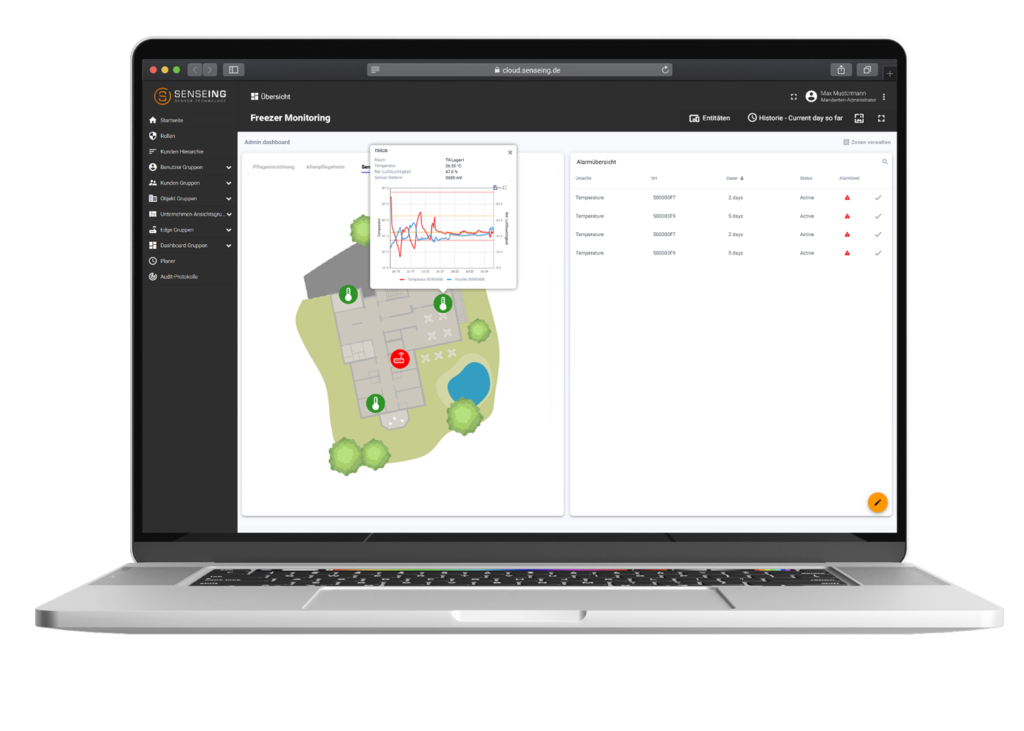Refrigerator temperature logger: What is important?
In industries where the storage of temperature-sensitive goods is critical to quality, safety and regulatory compliance, refrigerator temperature loggers play a crucial role. Whether in the food industry, healthcare or pharmaceutical facilities, ensuring optimal storage and transportation conditions is not only a business necessity, but also an ethical obligation. In this article, we explain what you should look for when purchasing data loggers to ensure that the storage temperature of your temperature-sensitive goods is always reliably documented.
Offline temperature logger and online temperature logger
Temperature data loggers can be divided into two basic categories: Loggers that are not integrated into a network, i.e. are read out manually via interfaces such as USB, and loggers that are integrated into a network, i.e. send data wirelessly, e.g. to a cloud.
The choice between offline and online temperature loggers depends on your specific requirements. Offline loggers are easier to integrate, but involve considerable effort in terms of evaluation and allocation. Online loggers enable automatic data transmission via the Internet and, depending on the wireless connection, transmission in real time.
Comparison table: Offline vs. online temperature logger
| Features | Offline temperature logger | Online temperature logger |
|---|---|---|
| Local data storage | ✓ | ✓ |
| Real-time monitoring | ✗ | ✓ (Dependent on technology) |
| Independence from network | ✓ | ✗ |
| Remote access and alerts | ✗ | ✓ (Possible via the Internet) |
In addition to the general classification into offline or online loggers, other requirements play an important role in selecting the ideal logger for your application.
1. Measuring accuracy
Different areas of application place different demands on the measuring accuracy of temperature loggers. When monitoring the temperature of rooms such as offices or lounges, a measuring accuracy of +/-1 °C may be sufficient. In research laboratories or the food industry, on the other hand, the precession requirements can be considerably higher. When selecting data loggers, it is therefore particularly important to ensure that the devices meet the measurement accuracy required for the respective application. In addition, you can save costs for measuring accuracy that you may not even need.
2. Battery life
Wählen Sie einen Temperaturlogger mit niedrigem Stromverbrauch, um eine längere Betriebsdauer zu gewährleisten und somit die Kosten für Batteriewechsel zu minimieren. Zudem gibt es Anbieter welche im Rahmen eines Servicevertrags Batteriewechsel- oder Wartungen durchführen.
3. Connectivity/Integration
Ensure simple and user-friendly integration of your temperature logger by choosing a system that can be easily integrated into your existing infrastructure. Especially when using online data loggers, choosing the right wireless technology is crucial. For interference-free data transmission, it is important that the wireless network has sufficient coverage. Technologies such as LoRaWAN which are characterized by a long range, low energy consumption and good building penetration. If you already have a software system, make sure that the data loggers can be easily integrated into it.
4. Real-time monitoring and alerting
Check whether an alarm function is required for your application in accordance with the certification requirements. Advanced temperature loggers with real-time monitoring and alarm configuration enable an immediate response to temperature fluctuations or device failures, which helps to minimize potential damage. It should be noted that these alarm functions are only available with online loggers, as a continuous network connection is required for real-time transmission.

5. Compliance and documentation
Compliance with legal regulations is mandatory in many industries. Your temperature logger or the associated software should therefore have automatic data recording and easy-to-understand reporting functions. This facilitates documentation for audits and inspections.
6. Flexibility for different requirements
Take the specific requirements of your industry into account. Some temperature loggers offer functions that are specifically tailored to the needs of food businesses or care facilities. For example, choose a model that can record multiple parameters to be more flexible and better meet your individual requirements.
Temperature logging with SenseING
We would be happy to advise you on your specific requirements and offer you customized solutions in the field of temperature logging with our products. Contact us for further information and individual advice.


